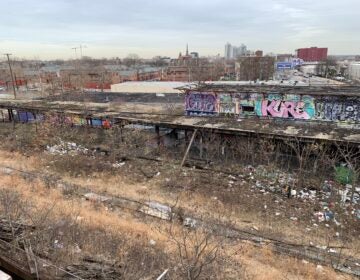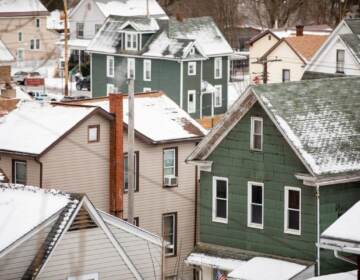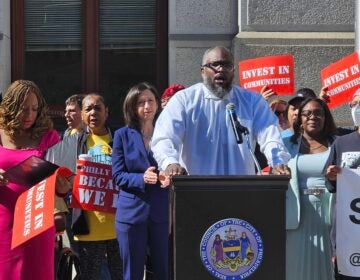Can Nikil Saval cancel rent during a pandemic and keep landlords whole?
Nikil Saval beat longtime state Sen. Larry Farnese with a promise to change Harrisburg. A bold approach to housing policy is core to his vision.

File: Pennsylvania state Sen. Nikil Saval of Philadelphia. Saval, along with state Sen. Maria Collett, has proposed a bill that would require AAPI studies in Pennsylvania schools. (Emma Lee/WHYY)
Nikil Saval hasn’t had a lot of free time since November when Philadelphia voters elected him to state Senate. The time dwindled further this week when he began his first Senate session as the Democratic chair of the Senate Urban Affairs and Housing Committee.
The little time he does have, he spends with his toddler.
“He’s a super joy right now in my life,” said Saval, who represents the First Senate District, which encompasses Center City, South Philadelphia and the lower section of North Philadelphia.
When he manages to step away from the office and the kid, he’s playing the piano, playing tennis or watching basketball.
“I was trained as a classical pianist, not good, but I play,” he said jokingly.
Everything happens in the rowhouse he shares with his son and his wife, a historic preservationist. With the pandemic raging, his office is now in the basement.
First day on the job as the Senator for the First District in Pennsylvania! (Just before going down to the basement to get on Zoom.) Excited to serve! pic.twitter.com/Q2ozh30aQ7
— Nikil Saval (@NikilSaval) December 1, 2020
Saval’s journey to (virtual) Harrisburg wasn’t the usual one. Many in Philadelphia knew him as a journalist and author writing about urban planning and architecture, then as a community organizer, and a ward leader for the Second Ward. He was the first Asian American in the last role and is the first one to ever be elected to Pennsylvania’s state Senate. He was also endorsed by Bernie Sanders and ousted longtime state Sen. Larry Farnese in the Democratic primary, riding on the progressive wave that has promised to put housing at the center of its agenda.
Saval has already gotten to work co-sponsoring a bill with Sen. Vincent Hughes that would prevent evictions and foreclosure for the 60 days following the expiration of Gov. Tom Wolf’s emergency declaration. Wolf’s declaration, which included protections for renters and homeowners, is set to expire next month.
On Wednesday, a bill for rental assistance passed out of the Senate to the House, but an amendment Saval created with an eye to accountability did not. His addition would have added an assessment date to ensure funds are flowing to the people they are supposed to help in time for the state government to meet a federal deadline.
Saval introduced the amendment after the state failed to spend all its federal money for rent and mortgage relief in December and the Department of Corrections ended up with a roughly $108 million windfall.
The PA Senate voted to send rental assistance to the House—without a key amendment: a reasonable date to assess whether the state is distributing funds to meet a federal deadline.
If we miss the deadline, we lose the money. Thousands will lose out if we don’t fix this. https://t.co/ZCleBZo4M0
— Nikil Saval (@NikilSaval) January 27, 2021
Still, he’s not deterred.
Learning from losing a home
Saval traces his focus on housing back to his first experience of housing instability at age 18. Saval’s parents owned a pizza shop where he grew up in Los Angeles and the landlord sold the building. His parents ended up selling their house because they couldn’t afford it and moved back to Bangalore, India while he was in college at Columbia University in New York.
When he graduated, he was making about $28,000 a year and spending about half of it on housing. He recalls borrowing money to keep going.
“That experience and not having a stable place to call home and fearing that I would lose it was pretty fundamental to me,” he said.
He said that fear never really went away. Today, the senator’s chief of staff is a tenants’ rights lawyer.
“There’s a constituency that is willing to fight for this,” Saval said.
Saval thinks canceling rent for those hit hard by the pandemic and resulting recession is possible. He plans to introduce COVID-19 relief related housing proposals that would protect tenants while freezing mortgage payments for landlords. The idea is to keep landlords whole while keeping tenants housed. The other bill would preclude criminal background checks in rental housing applications, similar to the “ban the box” movement guarding against job discrimination.
Saval supports cooperatives and land trusts, the latter a policy solution that has recently gained some traction in Philadelphia.
His office is working on identifying funding mechanisms on the state level to support more statewide experimentation with new models.
He also wants to support programs designed to electrify residential housing and reduce the state’s reliance on extractive energy resources. He is open to any incentives to help finance green upgrades to eliminate fossil fuels and increase energy efficiency.
“We should be moving all of our housing off of natural gas,” he said. “We should be retrofitting our housing stock and it can be a workforce development initiative.”
Fundamental to his drive is a belief that housing is a human right — a view the Republican-controlled state legislature has not embraced. He sees attitudes changing as Pennsylvania continues to attempt to weather the storm of the pandemic.
“It’s become more prominent in people’s minds again because there is a widely felt housing crisis and it’s exacerbated dramatically by COVID-19,” he said.
Saval said he wants to make the Senate Urban Affairs & Housing Committee a more powerful force in Harrisburg. Historically, hasn’t had as much power compared to other committees in the legislature. But partisan and racial divides that have been obstacles in the past can be overcome, he says. After all, housing and land use issues affect the entire state, particularly rural areas struggling with poverty and vacant land.
Saval believes his past as an organizer will guide him forward.
“You’re not really just there to be this charismatic individual who accomplishes things on your own,” he said. “Those ideas come from movements and advocates and then you’re a vehicle for it.”
He still uses his history in social movements to help his current career. His office does policy roundtables that are advocates and community leaders who are dedicated to housing justice. The idea is that both the roundtable participants and the office are constantly sharing ideas. He never wants people to feel like he’s pandering since he’s inviting people to the table and encouraging them to advise him.
“We need to create policies that are not just negotiated in Harrisburg,” Saval said. “They need to be public in some sense.”

Subscribe to PlanPhilly
WHYY is your source for fact-based, in-depth journalism and information. As a nonprofit organization, we rely on financial support from readers like you. Please give today.









